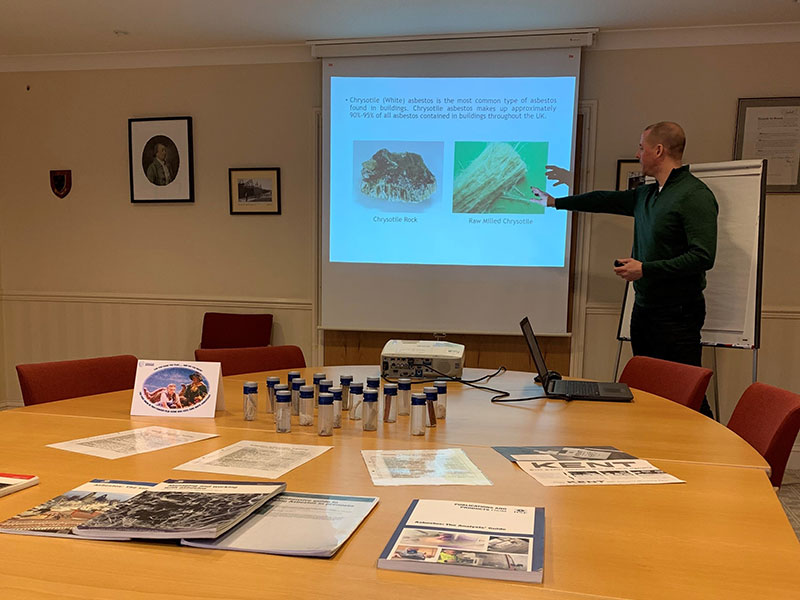What is asbestos awareness training and who needs it?
Now more than two decades on from the final banning of all forms of asbestos in the UK towards the end of 1999, the substance remains notorious for its pernicious effects on human health.
Asbestos was once extremely widely used in UK industries such as shipbuilding and construction, valued on account of such factors as its relative affordability, availability, physical strength, and fire resistance. Over the course of the 20th century, however, it became increasingly widely known among the British public that the inhalation of asbestos fibres could lead to the development of potentially fatal health conditions, such as mesothelioma and asbestos-related lung cancer.
This situation culminated in the eventual complete ban on the importation and use of asbestos in the UK by the end of that century. However, asbestos-containing materials (ACMs) do continue to be present in many public, domestic, and commercial buildings across the UK that date from prior to the year 2000.
You can probably begin to see, then, why asbestos awareness training is needed for certain professionals, even in the 2020s. A variety of workers – such as construction and demolition workers, plumbers, electricians, roofers, plasterers, and many others – could potentially come into contact with and disturb ACMs, with all the associated risks to health this could bring.
What is asbestos awareness training?
Before we go any further in describing what asbestos awareness training consists of, we should be very clear about the purpose of such training.
In short: this type of training is not for professionals who intend to carry out work that they know will definitely disturb ACMs on the site where they will be working. If this describes your situation, you will need to ensure a deeper level of information, instruction, and training is provided.
What asbestos awareness training is aimed at, then, is helping workers – such as those in the categories we mentioned above – to avoid work that could disturb ACMs during any normal work potentially disrupting the fabric of a building. After all, with ACMs frequently being contained within such fabric, workers and supervisors will appreciate having the information that they require to minimise any risk of asbestos disturbance.
While asbestos awareness training – also often referred to as “Cat A”, or Category A, training – is the lowest level of asbestos training, there is still much that a good training course will need to cover. This will encompass such matters as:
- The properties of asbestos, and how the worker can recognise it
- The potentially highly adverse health effects that can arise from someone ingesting or breathing in asbestos fibres
- The various types of asbestos materials, how they were used, and the likelihood of them occurring in certain types of setting
- How control measures can be put in place, and followed, in order to minimise the chance of being exposed to asbestos
- The general procedures that a worker should follow in the event of an emergency, such as if asbestos dust is released in an uncontrolled manner in the space where they are working
The key overarching asbestos legislation in the UK is the Control of Asbestos Regulations 2012 (CAR 2012). Regulation 10 of this legislation states that “every employer must ensure that employee[s] are given adequate information, instruction and training where that employee is, or is liable to be, exposed to asbestos, or if that employee supervises such employees.”
Even more specifically, the regulations make clear that Category A awareness training is legally required for anyone who may encounter asbestos but is not required to directly work with the material.
Who needs asbestos awareness training?
From reading the above, you will have hopefully already gotten a sense of some of the types of workers that are likely to require – and greatly benefit from – asbestos awareness training.
The below is certainly not an exhaustive list of such workers, but includes typical examples:
- Construction workers
- Demolition workers
- Electricians
- Plumbers
- Joiners
- Painters and decorators
- Plasterers
- Heating and ventilation engineers
- Telecommunication engineers
- Installers of fire alarms and burglar alarms
- Building surveyors
- Architects
Many of the professionals included in this rundown will carry out such tasks as drilling, sanding, and cutting elements of building materials over the course of their usual work. Disruptive processes like these could easily cause the accidental disturbance of asbestos – and the associated release of dangerous asbestos fibres – if they have not been trained in asbestos risks.
What is the importance of asbestos awareness training?
As we touched on above, Category A awareness training is a legal requirement for workers who are not expected to directly work on ACMs, but who nonetheless could come into contact with this lethal substance over the normal course of their work. So, this form of training is essential even simply for staying on the right side of the law.
But of course, Cat A training is crucial for reasons beyond this. According to the UK Health and Safety Executive (HSE), asbestos presents negligible risk to health if it is in good condition and is not damaged or disturbed. However, in the event that such disturbance or damage does occur, loose asbestos fibres can easily be released into the air, and subsequently breathed in by someone nearby.
Asbestos-related disease has a long latency period, so it is not the case that if someone inhales or ingests asbestos, they will immediately become ill. Indeed, it might take many decades for any signs of such disease – such as asbestosis, asbestos-related lung cancer, or mesothelioma – to become apparent to the sufferer. By then, it is tragically often too late to treat the condition in a way that will make much difference to the patient’s prognosis.
Mesothelioma, for instance – which is a type of cancer that develops in the lining covering the outer surface of some of the body’s organs – often has a particularly poor survival rate, with around 2,500 deaths a year in the UK being attributed to this disease. This accounts for around half of the asbestos-related deaths that continue to happen in the UK, even into the 2020s.
So, we hope you can begin to understand from this, how imperative it is to proactively help protect workers’ health and safety by providing them with asbestos awareness training in the situations in which this is appropriate.
What are the benefits of asbestos awareness training?
Anyone and everyone who uses or visits a particular building containing asbestos – and if the given building was constructed or renovated prior to the year 2000, it is very likely to contain asbestos – has a certain level of responsibility to help minimise asbestos risks.
By providing asbestos awareness training, you can play your own positive role in this, giving workers the information and skills that they require in order to protect themselves.
When one considers the considerable healthcare costs and legal liabilities that can arise from situations where someone was exposed to asbestos and subsequently developed an asbestos-related disease, it is easy to understand why the UK’s current laws for the management of asbestos are as strict as they are.
It is not in anyone’s interests for the UK National Health Service (NHS), for instance, to be put under greater pressure as a result of asbestos-related disease that could have been avoided. And of course, as an employer, you will not wish to be at risk of having expensive and distressing legal action taken against you, following an instance of someone who worked for you being diagnosed with such a potentially life-limiting, or fatal, health condition.
Sadly, you only need to consult our industry news pages here at Oracle Solutions, to find examples of such tragic situations, and the fines and penalties that have often been imposed on employers and dutyholders following exposure incidents.
Furthermore, the implementation of asbestos awareness training contributes to a broader culture of safety within the organisation that provides such training. So, the ultimate benefits of such a course can even transcend matters directly related to asbestos.
How do you implement asbestos awareness training?
We can well understand you feeling intimidated by the thought of trying to find the right provider of asbestos awareness training, if you are new or inexperienced in doing so. You will naturally want to find a course that is comprehensive and that comes from a well-respected company in the asbestos field, perhaps with certain accreditations or certifications to back it up.
Such a combination of desires and requirements is why you might turn to our own Category A asbestos awareness training here at Oracle Solutions. Our course is approved by the UK Asbestos Training Association (UKATA), in addition to being fully CPD (Continuing Professional Development) certified. It covers the essentials of asbestos awareness, and runs for about four to five hours, although the shorter “refresher” course only takes approximately two hours.
Indeed, continuous learning should be an uppermost priority as far as any organisation’s asbestos management is concerned, and this applies very much to asbestos awareness training, too. Not only do workers in the aforementioned categories need to ensure their knowledge is fresh and has not been faded by time, but they also need to make themselves aware of any new regulations or other requirements that may have been brought in since they last received asbestos awareness training.
Arranging for a refresher course in asbestos awareness to be carried out among your workers every 12 months, as a minimum, will greatly help to ensure such current and maintained knowledge.
Conclusion: asbestos awareness training is vital for ensuring safety and legal compliance
As we stated above, asbestos awareness training may be the lowest level of asbestos training, but this does not prevent it from playing an utterly imperative role for all manner of employers and professionals in the UK.
Workers such as those involved in construction, demolition, electrical installations, roofing, painting and decorating, and many other key processes within a building, stand to benefit immensely from being provided with the right asbestos awareness training. It will help them to be proactive in ensuring their own safety – as well as that of other people – during their work on site.
So, if you are an employer or employee with a need to seek out and/or provide this crucial type of training, we would urge you to do so, not least as it is very much a legal obligation, too.
To learn more about our own asbestos awareness training here at Oracle Solutions, please feel free to click through to the relevant page of our website. Alternatively, to have a discussion with us about any aspect of what we do, and to request a free and fast quote from us, please don’t hesitate to call the team now, or to send us an email.

Written by Brendan Coleman
Brendan Coleman, with decades of experience in the asbestos industry, is a dedicated Quality Manager. Certified as a surveyor and analyst, he is adept in operations and quality management with a keen focus on HSE compliance. His expertise is pivotal in maintaining high safety and efficiency standards. Brendan ensures our UKAS accreditation requirements are consistently met and exceeded, upholding stringent standards in asbestos remediation. His commitment to enhancing quality and customer satisfaction makes him an essential advisor in asbestos management.

